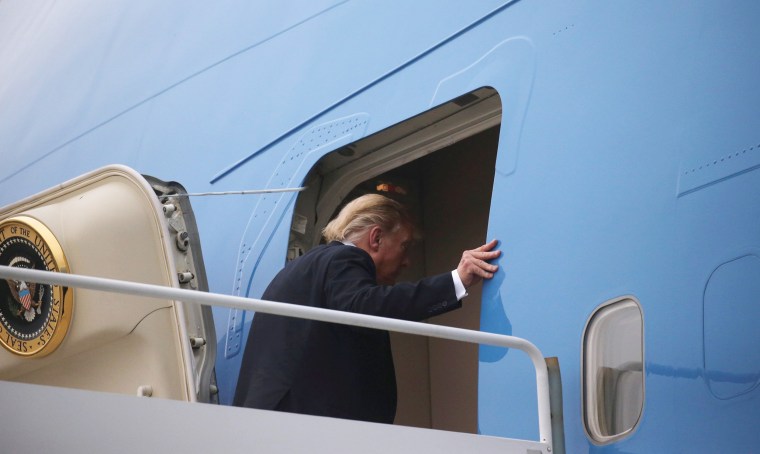HANOI, Vietnam — President Donald Trump touched down in Washington a few hours ago having endured a brutal stretch overseas in which the limits of his power at home and abroad, and the perils of his personal conduct, were revealed all at once and in humiliating fashion.
Here in Southeast Asia, half a world away from home, Trump behaved solicitously toward a notorious dictator before backing away from what even his staunchest allies saw as a potentially calamitous nuclear deal only at the last minute, leaving himself no obvious path forward for an elusive goal — bringing North Korea back into the community of nations — that has been a central piece of his foreign policy agenda.
"High-level diplomacy can carry high-level risks," Senate Majority Leader Mitch McConnell, R-Ky., said in a nod to the breakdown in negotiations, "but the president is to be commended for walking away when it became clear insufficient progress had been made on de-nuclearization."
Back home, Trump's former personal lawyer and fixer, Michael Cohen, was laying out a narrative of Trump as the consummate "con man," while fellow Republicans declined to defend the president's behavior, began to distance themselves more clearly from his effort to use executive authority to build a border wall and cheered his failure to strike a deal with Kim.
It may have been one of the worst weeks of Trump's presidency, concentrated in just a few harrowing days.
On Wednesday, in compelling congressional testimony, Cohen portrayed the president as a businessman who played fast and loose with tax laws, his charity's money and payments to contractors, and as a candidate who had little regard for the law in directing Cohen to provide hush money to cover up alleged marital infidelity, pursuing a real estate development in Moscow during the 2016 election and discussing the benefits of WikiLeaks releasing stolen Democratic National Committee emails to help his fortunes.
The public session brought signs Trump was losing some steam — albeit at the margins — with his cheering section: fellow Republicans in Congress.
Rather than defend Trump, House Republicans on the Oversight and Reform Committee chose to attack Cohen's character — a tacit acknowledgment that protecting the president's reputation was a more difficult charge.
And while the dam has hardly broken, Trump is seeing more cracks in the coalition of Republicans willing to support the national emergency he declared to fund a border wall without congressional consent.
On Thursday, Sen. Lamar Alexander, R-Tenn., took to the Senate floor to offer an admonition to Trump, asking him to reconsider the move.
"There has never been an instance where a president of the United States has asked for funding, Congress refused it and the president then has used the National Emergency Act to justify the funding anyway," Alexander said.
Alexander stopped short of saying he would vote for a House-passed resolution terminating the emergency declaration, but he escalated the pressure on Trump from within his own party to abandon his plan to execute an end-run around Congress, with the effort to nullify his emergency declaration now potentially just one GOP vote away from approval. On Tuesday, with Trump in Vietnam, 13 House Republicans voted with a unified House Democratic Caucus to cancel the emergency.
Ron Bonjean, a former Republican congressional leadership aide and a partner at the firm Rokk Solutions, said the resistance to Trump within the GOP won't get worse if he retains the backing of the party's core voters.
"He’s actually getting rather light Senate Republican pushback on the emergency declaration compared to what it could be at this moment by circumventing Congress," Bonjean said. "As long as the base stays with the president, most Republicans are not breaking from Trump for fear of facing a primary challenge back home."
Bonjean added that while many Republicans weren't sure what to make of the Kim summit at the outset, "walking away from Hanoi early was considered a smart thing to do for the country and he deserves the praise for not reaching for a deal that wasn't there to be made."
Not only was Trump, the leader of the free world, unable to bend Kim, the tin pot dictator of one of the world's last remaining "rogue" nations, to his will, Kim left the deal-seeking Trump walking away from the altar amid a dispute between the two countries over just what was in dispute.
To add intellectual insult to injured American pride, Trump said that he believed North Korea's Kim Jong Un's claim not to have known anything about the treatment of Otto Warmbier, an American who died shortly after returning home from more than a year in captivity in North Korea — an assertion of ignorance that former U.S. ambassador to the United Nations Bill Richardson said was "totally impossible."
Former Vice President Joe Biden, who served for many years as the chairman of the Senate Foreign Relations Committee, said Thursday that he hopes the summit debacle was a teaching moment for Trump.
"I hope I don't come across as condescending, because I don't mean it," Biden, who is considering a run for president in 2020, said. "I hope the president has learned a really important lesson: Diplomacy matters, preparation matters."
Another thing Trump learned for sure: Spending a few days on the road can't keep you from enduring a truly terrible week in Washington, too.

